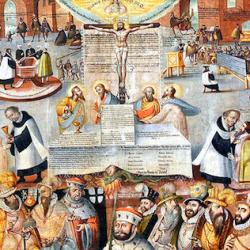In his contribution to Denominationalism, Winthrop Hudson suggests that one of the principles of English Independent ecclesiology was the refusal to “make our present judgment and practice a binding law unto ourselves for the future” (25).
It’s a stance based on a recognition of fallibility and proneness to sin. In the words of a work called “An Apologetical Narration,” written by dissenters from the Westminster Assembly, “we had too great an instance of our own frailty in the former way of our conformity, and therefore . . . we kept that reserve . . . to alter and retract (though not lightly) whatever should be discovered to be taken up out of a misunderstanding of the rule” (25).
In 1639, the elders of a New England church said much the same: “We see as much cause to suspect the integrity of our own hearts as yours; and so much the more, as being more privy to the deceitfulness of our own hearts than to yours. . . . which causeth us with great reverence to accept and receive what further light God may be pleased to impart unto us by you. But as we have believed, so have we hitherto practiced. . . . If anything appear to be unsound, and dissonant from the Word, which we for our parts cannot discern, we shall willingly attend to what further light God may send unto us by you” (26).
And Thomas Hooker: “We doubt not what we practice, but it’s beyond all doubt that all men are liars and we are in the number of those poor feeble men; ether we or may err, though we do not know it; what we have learned we do profess, and yet profess still to live that we may learn” (26).
Wise advice, exceedingly difficult in practice.















